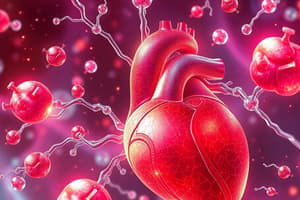Podcast
Questions and Answers
Which of the following is a common symptom of digoxin toxicity?
Which of the following is a common symptom of digoxin toxicity?
- Increased appetite
- Clear vision
- Bradycardia
- Nausea (correct)
What is the primary action of cardiotonics?
What is the primary action of cardiotonics?
- Increase blood pressure
- Dilate blood vessels
- Decrease heart rate
- Regulate heart contraction (correct)
Which of the following is NOT a nursing consideration for administering cardiotonics?
Which of the following is NOT a nursing consideration for administering cardiotonics?
- Assessing for signs of infection (correct)
- Monitoring for signs of toxicity
- Monitoring the patient's heart rate and rhythm
- Maintaining electrolyte balance
Why is it crucial for nurses to monitor the patient's electrolyte levels when administering cardiotonics?
Why is it crucial for nurses to monitor the patient's electrolyte levels when administering cardiotonics?
What is the meaning of the term "narrow therapeutic index" as it applies to cardiotonics?
What is the meaning of the term "narrow therapeutic index" as it applies to cardiotonics?
If a patient's heart rate is below 60 beats per minute, what should the nurse do?
If a patient's heart rate is below 60 beats per minute, what should the nurse do?
Which of the following is a common brand name for digoxin?
Which of the following is a common brand name for digoxin?
What is the primary function of cardiotonics?
What is the primary function of cardiotonics?
What is a primary action of anti-dysrhythmic drugs?
What is a primary action of anti-dysrhythmic drugs?
Which of the following is a nursing consideration for administering anti-dysrhythmic drugs?
Which of the following is a nursing consideration for administering anti-dysrhythmic drugs?
What should patients taking anti-dysrhythmic medications be educated about?
What should patients taking anti-dysrhythmic medications be educated about?
Which anti-dysrhythmic drug is known for potential drug-drug interactions?
Which anti-dysrhythmic drug is known for potential drug-drug interactions?
What is the recommended frequency for patients to take their anti-dysrhythmic medications?
What is the recommended frequency for patients to take their anti-dysrhythmic medications?
What type of drugs are classified as anti-anginal?
What type of drugs are classified as anti-anginal?
Why is it important for nurses to monitor heart rate and rhythm in patients taking anti-dysrhythmic drugs?
Why is it important for nurses to monitor heart rate and rhythm in patients taking anti-dysrhythmic drugs?
What should patients avoid while on anti-dysrhythmic medications?
What should patients avoid while on anti-dysrhythmic medications?
Flashcards are hidden until you start studying
Study Notes
Cardiac Medications Overview
- Cardiology involves a variety of medications targeting cardiac conditions and promoting cardiovascular health.
- Understanding different classes of cardiac drugs is essential for effective nursing practice.
Cardiotonics (Cardiac Glycosides)
- Regulate heart contractions; digoxin (Lanoxin) is the most notable example.
- Have a narrow therapeutic index; careful monitoring is necessary.
- Nursing considerations:
- Monitor heart rate and rhythm for one full minute; withhold administration if heart rate is below 60 beats per minute and notify a physician.
- Watch for signs of toxicity: symptoms include anorexia, nausea, vomiting, blurred vision, yellow-green vision, and dysrhythmias.
- Maintain electrolyte balance, particularly potassium levels, as low potassium increases the risk of digoxin toxicity.
- Educate patients about adhering to prescribed medication, monitoring pulse, and reporting adverse effects to their healthcare provider.
Anti-dysrhythmic/Anti-arrhythmic Drugs
- Used for treating cardiac rhythm abnormalities like atrial fibrillation and ventricular tachycardia.
- Nursing considerations:
- Closely monitor heart rate and rhythm due to the drugs’ effects on cardiac conduction.
- Assess for bradycardia or hypotension, especially with beta-blockers; withhold medication for low rates or pressures.
- Instruct patients on the importance of consistent medication adherence to prevent arrhythmia recurrence.
- Be aware of potential drug-drug interactions, especially with medications like amiodarone, which may increase adverse effects risk.
- Educate patients on monitoring heart status and avoiding exacerbating substances (alcohol, caffeine).
Anti-anginal Drugs
- Used to relieve chest pain due to inadequate oxygen supply to the heart.
- Includes organic nitrates, calcium channel blockers, and beta-blockers.
- Nursing considerations continue to focus on patient education, monitoring for effectiveness, and managing potential side effects.
Studying That Suits You
Use AI to generate personalized quizzes and flashcards to suit your learning preferences.




